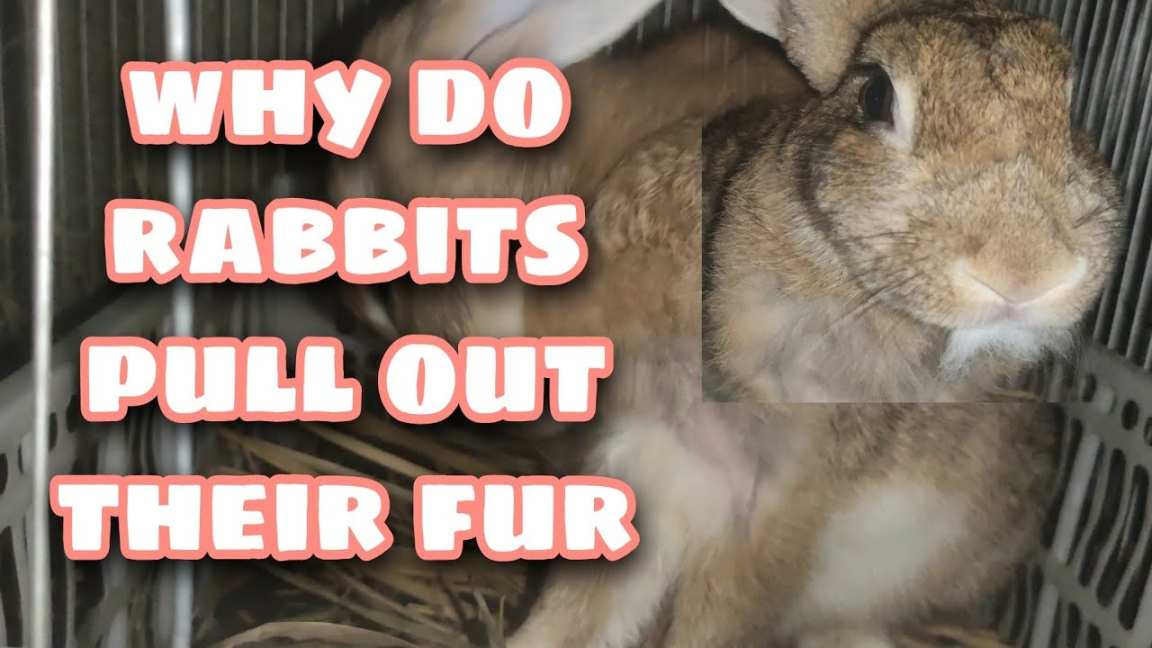Why is My Rabbit Pulling His Fur Out?
Rabbits are adorable and fluffy pets that bring joy to any household. However, sometimes rabbit owners may notice their furry friend pulling its fur out. This behavior can be concerning and may indicate an underlying issue that requires attention. In this article, we will explore some reasons why rabbits pull their fur out and provide insights on how to address this behavior.

Stress and Anxiety
Just like humans, rabbits can experience stress and anxiety. Stressful environments, changes in routine, loud noises, or the presence of predators can all contribute to a rabbit feeling anxious. In response to these feelings, rabbits may engage in fur pulling as a self-soothing mechanism. This behavior can become a habit and should be addressed to prevent further complications.
Signs of stress and anxiety in rabbits:
- Excessive fur pulling or overgrooming
- Restlessness and excessive movement
- Reduced appetite
- Aggression or increased irritability
- Abnormal fecal pellet production or decreased litter box usage
Skin Irritation or Allergies
Rabbits can develop skin irritations or allergies that cause discomfort and itching. This can lead to excessive scratching and fur pulling. Common causes of skin irritation include fleas, mites, or allergies to certain foods or environmental factors. It is essential to monitor your rabbit for any signs of skin issues and seek veterinary care if necessary.
Common signs of skin irritation or allergies:
- Redness or inflammation of the skin
- Presence of small bumps, scabs, or open sores
- Excessive scratching or biting of the affected area
- Changes in fur quality or loss of hair
- Discomfort or signs of pain when touched
Dietary Imbalance
A rabbit’s diet plays a crucial role in their overall health and well-being. If a rabbit is not receiving a balanced diet, it can lead to nutritional deficiencies. These deficiencies can manifest in various ways, including fur pulling. Ensure that your rabbit’s diet consists of high-quality hay, fresh vegetables, and a limited amount of pellets. Consulting with a veterinarian or a rabbit nutritionist can help you determine the best diet for your furry friend.
Common signs of dietary imbalance:
- Excessive fur pulling or overgrooming
- Changes in fecal pellet appearance or frequency
- Weight loss or gain
- Reduced appetite or abnormal eating habits
- Weakness or lethargy
Parasites
Parasites, such as fleas, ticks, or mites, can infest a rabbit’s fur and skin, causing discomfort and irritation. In response to the itchiness, a rabbit may pull its fur out to alleviate the irritation. Regularly inspect your rabbit’s fur and skin for the presence of parasites, and consult with a veterinarian for appropriate treatment options if necessary.
Common signs of parasite infestation:
- Visible fleas, ticks, or mites on the rabbit’s fur
- Excessive scratching or biting of the affected areas
- Redness, swelling, or inflammation of the skin
- Presence of flea dirt (small black specks resembling pepper) on the rabbit’s fur
It is important to address fur-pulling behavior in rabbits promptly to determine the underlying cause and provide appropriate care. Seeking veterinary advice is crucial for a comprehensive evaluation and accurate diagnosis.
FAQs
1. Can stress cause a rabbit to pull its fur out?
Yes, stress and anxiety can contribute to a rabbit pulling its fur out. Identifying and reducing the sources of stress in the rabbit’s environment can help alleviate this behavior.
2. How can I prevent skin irritations in my rabbit?
Maintaining good hygiene, providing a clean living environment, and regular veterinary check-ups can help prevent skin irritations in rabbits. Avoid using harsh chemicals or shampoos that may cause skin reactions.
3. What should I feed my rabbit to prevent dietary imbalances?
A rabbit’s diet should primarily consist of high-quality hay, fresh vegetables, and a limited amount of pellets. Consult with a veterinarian or a rabbit nutritionist to ensure your rabbit’s diet is well-balanced.
4. How can I protect my rabbit from parasites?
Regularly check your rabbit’s fur and skin for signs of parasites. Implement a preventive parasite control program recommended by your veterinarian. Avoid contact with other animals that may carry parasites.
Related Articles…
Copyright Notice:
All images on this website are obtained from the internet and remain copyrighted to their original owners. If you hold copyright to any image and want it taken down, please reach us.